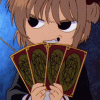| View previous topic :: View next topic |
| Author |
Message |
|
|
Angel M Cazares
 Joined: 23 Sep 2010
Joined: 23 Sep 2010
Posts: 5420
Location: Iscandar
|
 Posted: Thu Apr 20, 2017 12:51 pm Posted: Thu Apr 20, 2017 12:51 pm
|
 |
|
| Key wrote: | | While I don't agree that Utena is a poser show, I think this "have an open mind and heart to appreciate it more fully" kind of comment isn't any better than the too dense=pretentious attitude that others take. I'm inclined to call it pretentious because it takes what I see as a needlessly obtuse and complicated way to portraying what it wants to say. |
To me part of the issue is how people define what pretentious is. To me a pretentious anime is something that does not have good writing, but the producers pretend that it is smart (ex: Terror in Resonance). Utena is well written and full of substance, but it being needlessly obtuse and complicated does not automatically makes it pretentious.
|
| Back to top |
|
|
|
Knoepfchen
 Joined: 13 Dec 2012
Joined: 13 Dec 2012
Posts: 698
|
 Posted: Thu Apr 20, 2017 1:02 pm Posted: Thu Apr 20, 2017 1:02 pm
|
 |
|
| Key wrote: | | I always had the impression while watching it that the series was definitely saying something but wasn't talking to me.(But that tends to be true of my reaction to all Ikuhara works; I gave up on finishing Yurikuma Arashi about halfway through for similar reasons.) |
I didn't feel Utena was talking to me personally, either (possibly because I watched it long after leaving those lost and out of sync adolescent years behind). I have other fiction that does that for me on a much deeper level for all sorts of reasons. I still found it easy to enjoy and appreciate the show. Granted, my background (theater) probably means certain ways of storytelling will be up my alley by default, but especially when compared to Yurikuma (which I didn't finish), I thought Utena did have some good old pure entertainment value before begging to be dissected. That's a good thing. A work can be entertaining and thought-provoking, or whatever we/fans consider "deep", at the same time, which I why I both agree and disagree with the ninth grade argument.
|
| Back to top |
|
|
|
BodaciousSpacePirate
 Subscriber
 Joined: 17 Apr 2015
Joined: 17 Apr 2015
Posts: 3017
|
 Posted: Thu Apr 20, 2017 1:21 pm Posted: Thu Apr 20, 2017 1:21 pm
|
 |
|
| lhernan02 wrote: | | Yes, the moment you alienate the masses from your work, you are making a statement that not everyone is "worthy" of "wisdom," therefore all works should be accessible to the lowest common universally achievable level (in many third world countries at peace, education above ninth grade can be challenging). |
I don't really buy into the idea that understanding of art, and the messages it conveys, can somehow be tied to grade level... I've taught plenty of middle schoolers who can understand Voltaire, and plenty of college students who can't. Heck, I had a great graduate-level philosophical conversation during my prison outreach program last night with convicts who can barely read above a 5th grade level. When someone cares about a topic, complexity isn't an insurmountable barrier to entry.
|
| Back to top |
|
|
|
Key
Moderator
 Joined: 03 Nov 2003
Joined: 03 Nov 2003
Posts: 18178
Location: Indianapolis, IN (formerly Mimiho Valley)
|
 Posted: Thu Apr 20, 2017 1:24 pm Posted: Thu Apr 20, 2017 1:24 pm
|
 |
|
| angelmcazares wrote: | | To me part of the issue is how people define what pretentious is. To me a pretentious anime is something that does not have good writing, but the producers pretend that it is smart (ex: Terror in Resonance). Utena is well written and full of substance, but it being needlessly obtuse and complicated does not automatically makes it pretentious. |
Then what word would you used for it, then? I don't automatically equate "pretentious" with "poorly-written," as I see that term as more commonly applying to style (IOW, direction) choices rather than technical writing choices.
|
| Back to top |
|
|
|
BodaciousSpacePirate
 Subscriber
 Joined: 17 Apr 2015
Joined: 17 Apr 2015
Posts: 3017
|
 Posted: Thu Apr 20, 2017 1:30 pm Posted: Thu Apr 20, 2017 1:30 pm
|
 |
|
| Key wrote: | | Then what word would you used for it, then? |
I don't know, "highfalutin" is a pretty great option.
|
| Back to top |
|
|
|
Key
Moderator
 Joined: 03 Nov 2003
Joined: 03 Nov 2003
Posts: 18178
Location: Indianapolis, IN (formerly Mimiho Valley)
|
 Posted: Thu Apr 20, 2017 1:47 pm Posted: Thu Apr 20, 2017 1:47 pm
|
 |
|
| BodaciousSpacePirate wrote: |
| Key wrote: | | Then what word would you used for it, then? |
I don't know, "highfalutin" is a pretty great option. |
Okay, so what would would you use that doesn't make one sound like a country hick? 
|
| Back to top |
|
|
|
Shay Guy
 Joined: 03 Jul 2009
Joined: 03 Jul 2009
Posts: 2112
|
 Posted: Thu Apr 20, 2017 2:02 pm Posted: Thu Apr 20, 2017 2:02 pm
|
 |
|
|
I have complicated thoughts that I'm not sure how to organize into a proper commentary. Things like... whether a particular method of storytelling is meant to include or exclude, the question of how someone is "supposed" to respond to art, the notion of fandom forming social hierarchies over whether you have the right opinions (the "2deep4u" joke doesn't come out of nowhere). A lot of things.
Here's one starting point: a question. "What is a prince?" Your answer to that heavily influences how you interpret Utena's quest. By the time I finished the series in 2012, I had decided, rather circularly, that a prince is "someone who is recognized as a prince". In other words, its meaning is what society makes of it. I later looked at the same Ikuhara commentary you referenced (I bought the Nozomi DVD sets for my watch) and found his answer in episode 12: "someone who can exercise power".
It interests me that the same symbol in one work can have a completely different meaning in another. Sometimes there's a standard vocabulary for this stuff (like phallic imagery having something to do with masculinity and/or active sexuality), but consider "ice". When a character is closely associated with ice, what does that suggest? Isolation. Repression. Heartlessness. Right down to our verbal vocabulary -- "Ice queen." "Frigid." "Frosty." Now consider the most popular story featuring ice powers of the past decade, Frozen. There's some overlap -- "kingdom of ice-olation" -- but ice certainly doesn't signify suppression of emotion. If anything, it signifies an unrestrained and often uncontrollable abundance. (It'd be interesting to see a story where phallic and yonic symbolism have their meanings reversed for no apparent reason.)
There's a lot of symbolism in Utena. As the review notes, a lot of viewers don't "get" a lot of it. Quite possibly nobody has ever gotten all of it. Certainly, I didn't get any of the stuff to do with astrology, which is a field I know nothing about except that Aries is my sign (meaning Aradia Megido is my patron troll, which I am quite comfortable with). I would never have connected it with femininity; I have only a vague sense that fortune-telling is more of a Thing in modern Japan than the States, and is also more of a teenage-girl Thing.
So here's another question. When a message is transmitted, but not received, who is to blame? The recipient, for not being a good enough viewer? Or the sender, for not communicating effectively? Or perhaps the "recipient" in such a case is neither Alice nor Bob, but Eve?
"Besides, offering a bulleted, definitive breakdown of all the symbolism won't help anyone feel the emotions Utena explores any more than explaining a joke makes it funny. [...] I don't want to tell you what Utena is supposed to mean." The review says this, and immediately starts talking about what the symbolism means, because it's necessary for understanding it, just as surely as understanding Japanese or some other language it's been translated into is necessary. What good is a symbol that only means something to the creator, or that'll be lost on most of the people you want to reach? What good is art that can't communicate? One may speak of "an emphasis on processing entertainment emotionally over logically", but how well can symbolism contribute to that when you need a guidebook to even understand what emotions and connections it's supposed to evoke? As an extreme example, say I encrypt my message with a one-time pad I have never shared with my recipient; have I communicated?
Maybe Ikuhara feels that he can only express his ideas at all if he does so in the way that'll make the most sense to him. And if anyone else wants to listen as he talks, they're welcome to, and hopefully they'll get something out of it, even if they only share a quarter of the mental associations he worked from. Of course, I'm not sure that accounts for the answer to "What do you mean? What are you saying?" being "Figure it out your own damn self"... maybe it's just a broader question of when conventional storytelling serves your needs and when a different tack is best?
I'm not sure what the answer is, and my thoughts are probably irrelevant anyway. I'm not a semiotics expert, or indeed an expert on anything pertaining to the humanities. I'm a feral critic. And a STEM nerd, which Jacob doesn't seem too fond of as far as discussion and creation of fiction are concerned. Except Log Horizon.
As for Chu Chu, I choose to believe that he is a mouse monkey from the Earth Kingdom. Also, in response to Twitter chat: Wakaba is best girl; this is science fact.
---
Finishing up this post, I see similar comments have been made in the thread since I started (when there were only three posts)... ah, well. And a post with the same "only the sufficiently virtuous can understand" subtext I alluded to toward the top... and a couple that make me wonder if Jacob or other ANN writers will shortly be tweeting "ugh, of COURSE there would be WRONG people with WRONG ideas in the thread". (I have hangups.)
|
| Back to top |
|
|
|
|
SejinPK
Joined: 22 Dec 2013
Posts: 129
|
 Posted: Thu Apr 20, 2017 2:20 pm Posted: Thu Apr 20, 2017 2:20 pm
|
 |
|
Utena is probably not a work made "for me." I'm a straight white man who has had a privileged and sheltered childhood, adolescence, and early adulthood. It's taken me a ridiculously long time to start growing up and realizing what exists outside of my own head.
The first (and only, so far) time I watched Utena was right at the beginning of when I was getting interested in being able to parse movies and shows critically, to be able to understand their deeper, more intricate aspects. This isn't a method/mode of viewing that comes naturally to me, so seeing Utena when I did, I only understood the most basic things about it, such as the plot and some character relationships and motivations. Nevertheless, I remember liking it quite a bit based on what I did understand. It's a show I've been wanting to re-watch for quite a while now, but I'm holding off until the Blu-rays come out, hopefully sometime this year.
I don't think a series has to be "for you" for a person to be able to appreciate and enjoy it. I think being "for you" can definitely enable a work to resonate incredibly deeply with its target audience, but it's not the end-all be-all.
| Yttrbio wrote: | | It's not an entirely unreasonable point of view. There's a point at which you're making a show more and more impenetrable simply for the sake of being obtuse. If you have something to say, you should be able to say it comprehensibly. |
While I agree in part with this sentiment, I also think it's important to understand the "how" and the "why." Why symbolism, metaphor, abstraction, etc.? How are these things being used? In addition, it's a stylistic choice, which is very subjective. I do think that symbolism, metaphor, and abstraction can be very alienating if you don't understand the symbol/metaphor/abstraction, which I think contributes to people feeling like these ways of conveying meaning create a "members only" club for the people who "get it." This is disheartening to me, because it's a barrier of entry that can keep people from enjoying and appreciating a work. But I also don't think we should expect or demand that artists/creators do things only in certain ways. At the very least, that defeats the purpose of being creative.
Personally, I find the kind of stylings Ikuhara uses inherently interesting, visually, but the thing that I think draws me more to that kind of conveyance of meaning is that, to me at least, it sort of comes across "differently," somehow more directly (the big caveat here is that you need to understand the symbol/metaphor/abstraction, which is something I still often struggle with). So, if you're able to use them effectively, you can create many interacting layers of meaning in a work without it feeling cluttered, which can allow you to effectively put across and discuss complicated and nuanced ideas. I could certainly be wrong about this (and please correct me if I am), but I think this may be part of what Jacob was getting at with these statements about Ikuhara's MO from his Yurikuma Arashi write-up for the Winter 2015 preview guide:
| Quote: | | This director has made it crystal clear with his last two projects that he works in crazy-pants surrealism with a narrative pinned up around it in order to touch on deeply disturbing and complex societal issues[...]The divide between strange and often silly imagery in his stories juxtaposed with their dark subject matter allows his work to yield truth in a way exclusive to its chosen medium of animation. |
---
To give a more direct example of the kind of thing I'm talking about regarding symbolism/metaphor and "direct" conveyance of meaning, the Monogatari Series dials up the first person perspective to 15. Everything we're exposed to is incredibly subjective because it's filtered through the perspective of the narrator. In addition, Monogatari uses apparitions as metaphors for characters' internal issues.
In an arc of Monogatari in which the character Tsubasa Hanekawa is the narrator, she's confronted by a giant tiger apparition that sets things on fire. The tiger is actually born from an intense welling up of jealousy within Tsubasa. But, she's incredibly dissociated from her own emotions by her own active doing, so the tiger makes her feel incredibly uneasy when she first encounters it, and when she confronts it later on, it's depicted as this indomitable thing beyond her ability to reason with or defeat physically. The tiger, named Kako (which can be translated as "fire girl") is a visual metaphor for an aspect of Tsubasa that is burning with jealousy and that prompts her to literally go around committing arson.
By using symbolism and metaphor to put it across this way, this aspect of Tsubasa, and how she herself perceives it, is communicated to the viewer in a very direct way that would be much more cumbersome to do in a more conventional way. In addition to communicating Tsubasa's self-perception regarding her own emotions, depicting those emotions as an external entity that Tsubasa can verbally and physically confront underscores her emotional dissociation. Further, conveying those emotions this way, as Kako, allows the creators to present Tsubasa's internal conflict the same way you'd present an argument or fight between two characters in a more typically-presented drama or action show, which is generally perceived a certain way by viewers.
I think that by communicating it in this way, the emotional impact of all of this resonates more viscerally and immediately with the viewer than if it were presented as Tsubasa arguing against herself in her own head. Again, the big caveat is that for these things to resonate this way, the viewer has to understand what the symbol/metaphor means. But, if you do, a symbol/metaphor/abstraction functions as a sort of through-line that conveys its impact directly from the symbol/metaphor/abstraction to the viewer. Presenting meaning in this way (it's sort of compressed or condensed, if that makes sense) through an image or an event somehow bypasses the "long way around," which is if the meaning had been conveyed more typically, through dialogue or a series of actions. This is what I mean when I say a symbol/metaphor/abstraction can have a more direct or immediate impact on the viewer.
Hopefully this example helps get across what I was trying to say about how symbolism/metaphor/abstraction convey meaning more directly. I'm still really inexperienced with viewing media critically, so my ability to clearly articulate stuff like this can be pretty lacking sometimes. Hopefully I made sense.
---
Now, this kind of presentation isn't going to work for everybody, and that's totally fine. Different people view a work differently, and we all want and look for different things in our media. This doesn't make a work that doesn't cater to your (or my) sensibilities "bad," any more than not watching or enjoying things that utilize methods of conveyance that are seen as more "highbrow" or "hoity toity" makes a person "less than" someone who does watch and enjoy such an MO.
The last thing I wanted to say is that I'm really happy that Jacob is approaching his Utena reviews the way he is, working to make the show more accessible through explaining the "how" and the "why" of Ikuhara's MO.
|
| Back to top |
|
|
|
whiskeyii
 Joined: 29 May 2013
Joined: 29 May 2013
Posts: 2245
|
 Posted: Thu Apr 20, 2017 2:28 pm Posted: Thu Apr 20, 2017 2:28 pm
|
 |
|
| Shay Guy wrote: | | Of course, I'm not sure that accounts for the answer to "What do you mean? What are you saying?" being "Figure it out your own damn self"... maybe it's just a broader question of when conventional storytelling serves your needs and when a different tack is best? |
Someone somewhere (and it might've been here on ANN, but I honestly can't remember) said that--and I'm both paraphrasing and butchering the original statement: "What you make of Ikuhara's works depends on what you bring to the table, no more, no less", which to me pretty well sums up both his trollish attitude and his reluctance to expound on specific meaning.
I think I've only really seen Yoko Taro (known for Nier and Drakengard) and Fumito Ueda (head of Team Ico) display the same level of trolling/vagueness when folks ask them specifically about their work. In both cases, it seems like they want the player to come to a conclusion on their own, whether that matches up with their original intent or not, and that act of self-reflection on the part of the audience is far more important to them than any answer they could give. I get the impression that Ikuhara thinks along similar lines.
|
| Back to top |
|
|
|
Levonr
 Joined: 19 Nov 2003
Joined: 19 Nov 2003
Posts: 808
|
 Posted: Thu Apr 20, 2017 2:31 pm Posted: Thu Apr 20, 2017 2:31 pm
|
 |
|
|
I tried to watch this show back when it came out and couldn't stand it. Then I gave it another chance and loved it. The reason is the first time I watched it was dubbed and while I'm a hardcore dub fan and really like some of those actors this dub really put me off, they missed the mark for the characters & tone I felt. I highly recommend watching subbed even to dub fans.
|
| Back to top |
|
|
|
Angel M Cazares
 Joined: 23 Sep 2010
Joined: 23 Sep 2010
Posts: 5420
Location: Iscandar
|
 Posted: Thu Apr 20, 2017 3:20 pm Posted: Thu Apr 20, 2017 3:20 pm
|
 |
|
| Key wrote: | | Then what word would you used for it, then? I don't automatically equate "pretentious" with "poorly-written," as I see that term as more commonly applying to style (IOW, direction) choices rather than technical writing choices. |
If you are asking what word I would use to describe Utena's writing and execution, it is artistic. And I am not saying that you are equating pretentious with poorly-written. A work can be poorly written and not be pretentious. For example, last year's Hundred is a poorly written show, but it seems to embrace its mediocrity at all times. On the other hand, Elfen Lied is poorly written and mediocre at best, but its producers seem to want the audience to believe that it is offering some deep philosophical message.
Pretentiousness to me can only exist when there is mediocrity. The Utena tv series is well written and can be needlessly metaphoric and theatrical, but it is not pretentious because it does not pretend to be an anime masterpiece, it is a masterpiece. Oddly enough I do think the Utena movie is pretentious because it is a writing mess with stunning and over the top visuals that are devoid of meaningful substance.
|
| Back to top |
|
|
|
|
Chrysostomus
Joined: 11 Mar 2015
Posts: 335
|
 Posted: Thu Apr 20, 2017 3:32 pm Posted: Thu Apr 20, 2017 3:32 pm
|
 |
|
| SejinPK wrote: | | who has had a privileged and sheltered childhood, adolescence, and early adulthood. |
This is not directed only at you, but please stop with this ridiculous Marxist nonsense. Anyone who can watch Far East Asian cartoons at their leisure is ALREADY far more "privileged" than 70% of the world. You're not starving in some Venezuelan slum or being sold in a Libyan slave market. You are literally on the internet, with enough free time on your hands to be talking about an art form that can only exist in a certain affluent island nation. This is already having enough privilege millions of people all over the world can only dream of.
Last edited by Chrysostomus on Thu Apr 20, 2017 4:59 pm; edited 1 time in total
|
| Back to top |
|
|
|
zensunni
 Joined: 05 Mar 2010
Joined: 05 Mar 2010
Posts: 1291
|
 Posted: Thu Apr 20, 2017 3:44 pm Posted: Thu Apr 20, 2017 3:44 pm
|
 |
|
|
While I am a straight white male, that doesn't mean I didn't feel out of place for much of my youth for other reasons. (A large part of it being very similar to the personality issues suffered by the character Iori Nagase in Kokoro Connect, who was one of the first characters in fiction who I truly identified with, not because of any abuse, but simply because I had the same type of identity problem until I was in college.) But I also have several close friends and family members who do fall into the categories that Utena appears to be aimed at. In particular there are several women in my life who identify as some form of LGBTQ+. I found the story extremely good, though occasionally eye-roll worthy, but the eye-roll worthy spots were usually attempts at humor that I just thought fell flat. The movie version was a bit... out there, frankly. But it was a ton of fun!
I wasn't so sure about Yurikuma Arashi at first, but after the first few episodes, and reading some of the reviews of it by various reviewers, (Rose Bridges' review on her blog in particular comes to mind, if I recall correctly, as the one that really opened my eyes about the show) I began to appreciate what the show said about the ongoing struggle of queer women in a culture that truly wants them to be invisible. It may seem more benign than outright antipathy, but in a way, it isn't. It's a subtle thing...
|
| Back to top |
|
|
|
Key
Moderator
 Joined: 03 Nov 2003
Joined: 03 Nov 2003
Posts: 18178
Location: Indianapolis, IN (formerly Mimiho Valley)
|
 Posted: Thu Apr 20, 2017 4:27 pm Posted: Thu Apr 20, 2017 4:27 pm
|
 |
|
| angelmcazares wrote: | | If you are asking what word I would use to describe Utena's writing and execution, it is artistic. And I am not saying that you are equating pretentious with poorly-written. A work can be poorly written and not be pretentious. |
Think you're largely missing my point here. I was never intending to claim poorly-written → pretentious but instead that pretentious → poorly-written is what I don't agree with.
As for using the word "artistic"? As long as you are using it as a strictly neutral classification - IOW, not inherently a positive - then I suppose I'm okay with that. I've juste too often seen the term used in a "it doesn't need to make sense because it's artistic" context. (It probably wouldn't surprise you to know that I'm no fan of abstract art, which is what I equate Ikuhara's style with.)
| Quote: | | Pretentiousness to me can only exist when there is mediocrity. The Utena tv series is well written and can be needlessly metaphoric and theatrical, but it is not pretentious because it does not pretend to be an anime masterpiece, it is a masterpiece. Oddly enough I do think the Utena movie is pretentious because it is a writing mess with stunning and over the top visuals that are devoid of meaningful substance. |
Then we have inherently different interpretations of the term, as I see it more as a matter of attitude.
But that's fine. I don't want to distract this thread further with a long debate on semantics.
|
| Back to top |
|
|
|
Zin5ki
 Joined: 06 Jan 2008
Joined: 06 Jan 2008
Posts: 6680
Location: London, UK
|
 Posted: Thu Apr 20, 2017 4:47 pm Posted: Thu Apr 20, 2017 4:47 pm
|
 |
|
|
Having never seen this work before, and being generally wary of the genres into which it falls, it almost behoves me to determine how accessible and rewarding it can be for myself. This review series gives me the finest of opportunities to do this. I am appointing myself as a test subject of sorts. A consenting guinea pig, if you will. I'll be watching each episode in time for the weekly reviews to learn what I can, to feel my way around, and perhaps even to broaden my proverbial horizons.
After two episodes, my response is a broadly positive one. Plenty of scenes are dedicated, at least prima facie, to acquainting us with the protagonists without sacrificing characterisation for the sake of mere plot. There is something relievingly ordinary about Utena and Wakaba's exchanges amidst their environment of decorative excess, suggesting there will always be something recognisably human to see us through each episode, hopefully being sufficient in degree to counter the rampant visual metaphors or the student council's rather cold theatricality.
Narration and exposition are also surprisingly clear. The infuriating sense of "what does that mean", by which an adventurous production such as this may be derailed, has yet to pervade the story events on-screen: we can tell there is more than meets the eye to nearly everything—a good thing too, given the potent sexual imagery—but this doesn't cause the action in the foreground to be obscured to any lamentable degree.
My only substantial criticism at this point is the decision to pair the fight scenes with the bizarre Absolute Destiny Apocalypse chorus. As easily as it might enhance the sense of fatalistic importance to the duels, it may also deter a viewer not used to taking such experimentation seriously. I can tolerate it for the time being—the review makes it abundantly clear how crucial the music is to broader importance of the scenes it accompanies—but much like the discussions on this thread so far, bold creative decisions of such a kind do raise the point, as moral as it is aesthetic, of the extent to which the complex and sui generis expressions that artists reify should be moderated for the sake of engaging their fullest audience, especially if this audience is to stand to gain something of substantive personal value by keeping their attention.
This point of difference is compensated, I shall admit, by the moderate but heartful glee in seeing a composed, noble, unconventional but crucially imperfect heroine fending off the posturing advances of horrid men, something which goes a great way to explain this series' appeal off the bat. This is the sort of content that keeps people coming back in face of any manner of eccentricity.
As always, thank you Jacob for taking us through these episodes with such detail, miscellany and relish. I look forward to next week!
Last edited by Zin5ki on Thu Apr 20, 2017 5:26 pm; edited 1 time in total
|
| Back to top |
|
|
|
|
 Subscriber
Subscriber